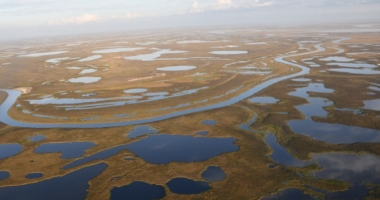Climate, Health and Equity Brief
Massive storms, new household incentives, and a critical year ahead
January 9, 2023

The Climate, Health & Equity Brief is GMMB’s take on the week’s news on the current impacts of climate change. If you haven’t subscribed yet, you can do so by clicking here.
Hot Topic: The road ahead. The last month has brought devastating storms across the country. Freezing temperatures, heavy snowfall and tornadoes wreaked havoc in the Midwest, and an “unusually catastrophic” blizzard in Buffalo, NY left dozens dead and highlighted how structural racism forces communities to bear the worst of storms unequally. Now, California is being inundated with an unprecedented sequence of storms that have delivered a ‘bomb cyclone,’ multiple atmospheric rivers, historic rainfall, high winds, and massive flooding across much of the state. Together, these weather events paint a clear picture of the increasingly dire state of the climate and the urgent need for action in 2023.
But the New Year also offers reason for hope, as historic progress on climate policy in 2022 comes to fruition and new opportunities for change lie ahead. This year, most American households can take advantage of thousands of dollars in tax credits through President Biden’s Inflation Reduction Act to transition their appliances, vehicles and home power sources to more sustainable options. Thanks to the landmark legislation, the U.S. Postal Service announced it will begin to replace its aging fleet of delivery vehicles with 66,000 EVs and develop tens of thousands of charging stations over the next five years.
However, progress on climate change faces a challenging new political landscape as Republicans take control of the House of Representatives. The GOP has pledged to block a range of Democratic efforts on climate action by stalling funding for loss and damage to developing nations, blocking U.S. renewable energy projects and punishing companies that commit to sustainable investing. The narrow road for climate legislation over the last two years has only tightened, with no room to lose momentum if we are to avoid climate catastrophe this century.
2023 is certain to bring new challenges and opportunities as the world looks to slow humanity’s impact on our warming planet. Diminishing reserves of groundwater in the U.S. and Middle East, a continuous rise in plastic production, collapsing ecosystems, and aging electrical grids threaten progress even as states take new action, the EPA prepares new regulations on power plant emissions, and the UN develops its new fund for climate loss and damage. 2022 was a landmark year for progress on climate; we can’t afford for this year to be any less.
— Matt and Traci, GMMB
Human Health
A first-of-its-kind regional study found that without immediate climate action, groundwater reserves in all Middle Eastern countries could be depleted by 2050, and temperatures in several cities are predicted to exceed the limits for human survival by 2100. (In-Cyprus)
A conveyer belt of intense storms and record rainfall wreaked havoc on communities across California, resulting in at least six deaths, widespread flooding, mudslides, sinkholes, evacuations and extended power outages. (USA Today)
NYU’s Graduate School of Public Service will conduct an “after-action report” that examines the preparations, response and recovery from December’s blizzard in Buffalo, NY that cut communities off from emergency services and left at least 39 people dead. (ABC News)
Planetary Health
Rising temperatures have slowed the annual freezing of the Great Lakes and increased lake-effect snow—snowstorms from increased differences in temperature between warm local water and the freezing air from the Arctic—including the deadly 51-inch Buffalo snowstorm. (USA Today)
Global plastic production has risen to more than 400 million metric tons annually, adding 1.8 billion metric tons of greenhouse gas emissions from extraction, transportation, production, incineration, and off-gassing in 2019 alone. (Bloomberg)
Equity
The December blizzard that devastated Buffalo, NY, demonstrated how disasters could expose cities’ structural racism where black people have been overrepresented among the dead, and the streets of white neighborhoods were cleared of snow more quickly than those of black neighborhoods. (op-ed, The Washington Post)
Peru’s Kichwa tribe is fighting for a share of the tens of millions of dollars in profits from the Peruvian government’s sale of 28 million carbon credits to two major oil companies to ostensibly “offset” their polluting emissions in the region, which is home to the tribe’s ancestral lands. (AP News)
Politics & Economy
With control over the House of Representatives, Republicans aim to roll back climate progress made in the first two years of the Biden presidency, including preventing pledged climate financing for developing nations, punishing companies that make ESG commitments, and increasing domestic oil extraction. (Roll Call, NPR, NPR)
As U.S. clean energy projects increase, a lack of investment in the transmission grid jeopardizes clean energy deployment and has delayed 1,400 gigawatts of solar, wind, and energy-storage projects—enough capacity to make the U.S. grid 80 percent clean by the end of the decade. (Canary Media)
Life as We Know It
A new study found that adding climate-impact labeling to fast-food menus can impact consumer food choices, with menus flagging “high climate impact” food items driving 23.5% of consumers to pick a more sustainable option. (U.S. News & World Report)
As Australia warms, large termites once found only in the northern reaches of the country are moving southward, with 12 of the 13 most invasive termite species expected to spread significantly by 2050 due to planetary warming. (The Washington Post)
Action
India’s Central Government has approved $2.3 billion to support the production, use and export of green hydrogen in an effort to make the renewable energy source affordable, curb India’s emissions and make the country a global hub for the emerging green hydrogen industry. (Time)
New York passed a sweeping “cap and invest” program that will help the state limit emissions, require polluters to purchase allowances to spew greenhouse gases and offer a mix of mandates and incentives to electrify buildings and vehicles. (Politico)
California is enacting a first-in-the-nation, $20 million pilot plan to cover two miles of irrigation canals with solar panels—an effort to combat drought by reducing evaporation and algae growth that would simultaneously generating power for 850 homes. (San Francisco Chronicle)
Using $3 billion from the Inflation Reduction Act, the U.S. Postal Service has now committed to buying 66,000 electric delivery vehicles, acquiring only electric delivery vehicles after 2026 and developing tens of thousands of charging stations over the next five years. (Canary Media)
Kicker
Thinking about ways to decarbonize your home, transportation, and energy generation? Check out The Washington Post’s summary of the Inflation Reduction Act tax credits available to you this year.
The greatest threat to our planet is the belief that someone else will save it.”
– Robert Swan
The GMMB Climate, Health & Equity Brief would not be possible without the contributions of the larger GMMB California team— Thomas, Baer, Aaron Benavides, Stefana Hendronetto, Sharde Olabanji and Quincy Tichenor, Feedback on the Brief is welcome and encouraged and should be sent to CHandEBrief@gmmb.com.






